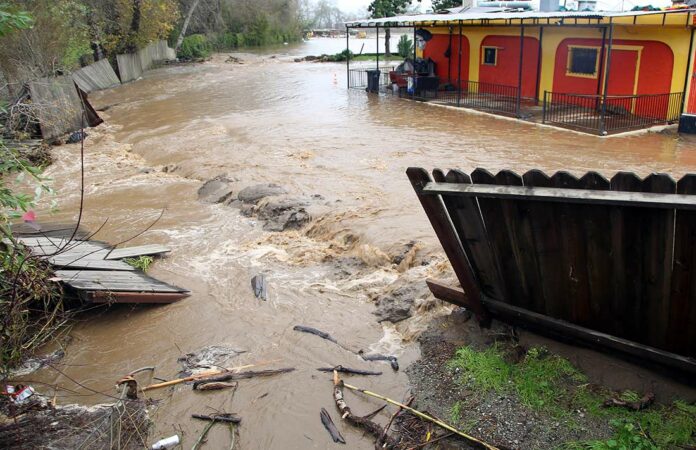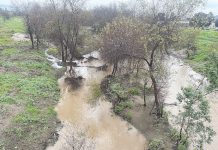
SANTA CRUZ COUNTY—Soon after President Joe Biden declared a major disaster for the areas of California besieged by a series of atmospheric river storms on Jan. 9—a move that allowed victims to request financial help from the Federal Emergency Management Agency—Watsonville resident Amy Thomas reached out to the agency for help.
Thomas’s home was inundated by two floods that destroyed her belongings and required her and her family to temporarily move to a rental residence.
She says her insurance will cover only repairs to her house, but not her personal property and other expenses, leaving her on the hook for the rental, among other things.
The agency says its disaster assistance program can help with temporary housing and emergency home repairs, as well as uninsured and underinsured personal property losses. The federal program can also go toward medical and dental expenses.
“Our whole house was damaged,” she says. “We have to replace everything, so I’m not sure what it’s going to be.”
Thomas’s initial call began two days of frustrating and fruitless efforts to apply through FEMA’s website. She finally called the agency, and—thanks to the fact that she was ready with several items of personal information—was able to put in an application.
With FEMA grants averaging $5,000, according to insurance industry experts, Thomas hopes she will receive enough to clean out the mud from her home and the areas around it.
Thomas’s trouble comes as no surprise for Amy Bach, whose company United Policyholders advocates for insurance holders and helps them navigate the often challenging and maddening claims process.
Insurance adjusters, she says, are trained to deny coverage for flooding.
Instead, Bach advises that people filing claims read and understand their policy before calling their insurance companies, and choose their words carefully when making a claim.
“If you say there was damage to the structure that allowed water to come in, that could be covered,” she said.
If denied, Bach says property owners can get a second opinion by contacting a public adjuster, which normally charge as much as 10% of the eventual payout, or a private attorney who may charge around 30%, Bach says.
It is also important to remember when dealing with insurance companies that they are private companies that do not have property owners’ interests as their focal point, Back says.
“The reality is that this is a financial situation where you’re dealing with a for-profit insurance company,” she said. “They’re trying to hold on to the money, and you need the money.”
Businesses suffering
As the storms were sweeping through the Central Coast, a tidal surge caused by the new moon and fueled by the wind and rain cleaved the Capitola Wharf in half. City officials say it will take more than one year to repair the Wharf, leaving the businesses there —the Wharf House restaurant and Capitola Boat and Bait—inaccessible and without power, and inventory languishing on shelves and in coolers.
“Everything is rotting,” says Tina Williams, who manages the 23-year-old bait business. “We haven’t been able to get out there.”
A related concern, Williams says, is whether the stench from the spoiled bait will infuse the clothing and other souvenirs she sells.
“We’re heartbroken,” she says. “That’s our business, that’s our livelihood.”
Williams says she is considering applying for one of the available aid sources, but stresses her main priority is helping her employees. This includes establishing a GoFundMe account, and hosting a spaghetti dinner fundraiser.
Williams will also open a small kiosk near the Wharf for one day on Feb. 11 for the Capitola Sip and Stroll.
Wha Jane Chung, who owns Orchard Park Market at East Lake Avenue and Holohan Road in Watsonville, said floodwaters quickly rose up twice—on New Year’s Eve and Jan. 9—and damaged much of her inventory, including several boxes of liquor bottles.
“It was so frightening,” she said Wednesday from behind the counter as she waited on customers. “I was yelling as the water came up. It came in the door and we tried so hard to stop it.”
Chung said she has never seen anything like the damage in her 15 years in the location.
“We had to close for 10 days to clean up,” she says.
Also thanks to Biden’s major disaster declaration, both residents and business owners affected by the storms and subsequent floods in Merced, Sacramento and Santa Cruz counties can qualify for low-interest federal disaster loans through the U.S. Small Business Administration.
Businesses and nonprofit organizations may borrow up to $2 million to repair or replace damaged or destroyed real estate, machinery and equipment, inventory and other assets.
In addition, businesses and homeowners can get financial help for the cost of improvements to protect and minimize the effects of similar disasters in the future.
Disaster loans up to $200,000 are available to homeowners to repair or replace damaged or destroyed real estate.
Homeowners and renters are eligible for up to $40,000 to repair or replace damaged or destroyed personal property.
Interest rates can be as low as 3.305 percent for businesses, 2.375 percent for private nonprofit organizations and 2.313 percent for homeowners and renters with terms up to 30 years. To be considered for all forms of disaster assistance, survivors must first contact the Federal Emergency Management Agency at www.disasterassistance.gov.
For information, call the SBA Customer Service Center at 800-659-2955 or visit www.sba.gov.
For a list of insurance claim resources, visit uphelp.org/sponsor-location/california
Residents and business owners who sustained losses in the designated areas can apply for assistance at DisasterAssistance.gov, by calling 800-621-3362 or by using the FEMA App.
For information on the GoFundMe page, visit gofund.me/a5728998. For the spaghetti dinner, visit evite.me/3mtGNvRE7A.













Channel 8 last night suggested you show up to Ramsay Park this morning (Saturday) . you do not need an appt. , bring ID and maybe some proof that you own the damaged property. NO, I am not a lawyer, but you do not need to be to use good, common sense and get help. self advocacy is essential in crises like these.
and be patient. patience is a virtue, and it will take a while for everything to get back to normal.